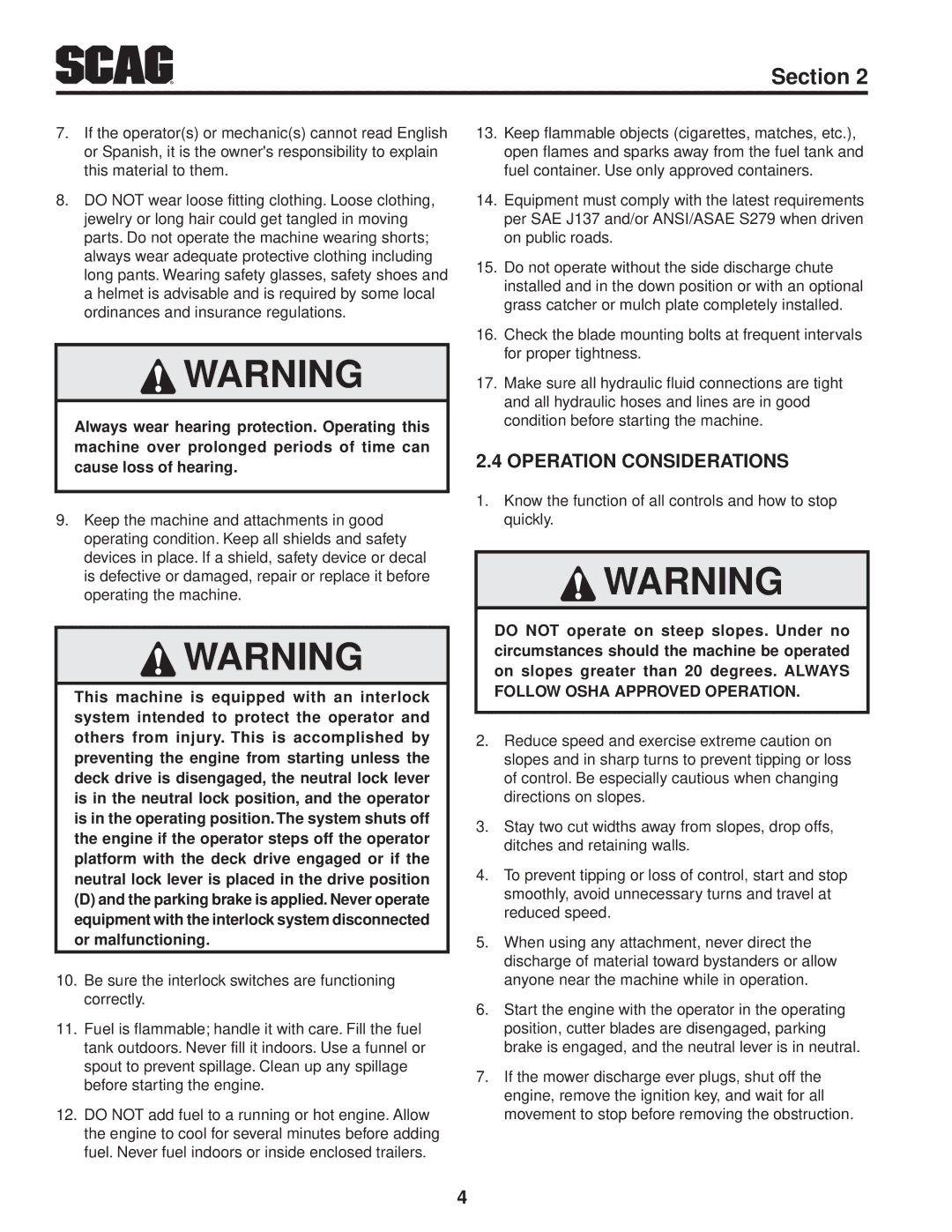
R
Section 2
7.If the operator(s) or mechanic(s) cannot read English or Spanish, it is the owner's responsibility to explain this material to them.
8.DO NOT wear loose fitting clothing. Loose clothing, jewelry or long hair could get tangled in moving parts. Do not operate the machine wearing shorts; always wear adequate protective clothing including long pants. Wearing safety glasses, safety shoes and a helmet is advisable and is required by some local ordinances and insurance regulations.
![]() WARNING
WARNING
Always wear hearing protection. Operating this machine over prolonged periods of time can cause loss of hearing.
9.Keep the machine and attachments in good operating condition. Keep all shields and safety devices in place. If a shield, safety device or decal is defective or damaged, repair or replace it before operating the machine.
![]() WARNING
WARNING
This machine is equipped with an interlock system intended to protect the operator and others from injury. This is accomplished by preventing the engine from starting unless the deck drive is disengaged, the neutral lock lever is in the neutral lock position, and the operator is in the operating position.The system shuts off the engine if the operator steps off the operator platform with the deck drive engaged or if the neutral lock lever is placed in the drive position
(D)and the parking brake is applied. Never operate equipment with the interlock system disconnected or malfunctioning.
10.Be sure the interlock switches are functioning correctly.
11.Fuel is flammable; handle it with care. Fill the fuel tank outdoors. Never fill it indoors. Use a funnel or spout to prevent spillage. Clean up any spillage before starting the engine.
12.DO NOT add fuel to a running or hot engine. Allow the engine to cool for several minutes before adding fuel. Never fuel indoors or inside enclosed trailers.
13.Keep flammable objects (cigarettes, matches, etc.), open flames and sparks away from the fuel tank and fuel container. Use only approved containers.
14.Equipment must comply with the latest requirements per SAE J137 and/or ANSI/ASAE S279 when driven on public roads.
15.Do not operate without the side discharge chute installed and in the down position or with an optional grass catcher or mulch plate completely installed.
16.Check the blade mounting bolts at frequent intervals for proper tightness.
17.Make sure all hydraulic fluid connections are tight and all hydraulic hoses and lines are in good condition before starting the machine.
2.4 OPERATION CONSIDERATIONS
1.Know the function of all controls and how to stop quickly.
![]() WARNING
WARNING
DO NOT operate on steep slopes. Under no circumstances should the machine be operated on slopes greater than 20 degrees. ALWAYS FOLLOW OSHA APPROVED OPERATION.
2.Reduce speed and exercise extreme caution on slopes and in sharp turns to prevent tipping or loss of control. Be especially cautious when changing directions on slopes.
3.Stay two cut widths away from slopes, drop offs, ditches and retaining walls.
4.To prevent tipping or loss of control, start and stop smoothly, avoid unnecessary turns and travel at reduced speed.
5.When using any attachment, never direct the discharge of material toward bystanders or allow anyone near the machine while in operation.
6.Start the engine with the operator in the operating position, cutter blades are disengaged, parking brake is engaged, and the neutral lever is in neutral.
7.If the mower discharge ever plugs, shut off the engine, remove the ignition key, and wait for all movement to stop before removing the obstruction.
4
